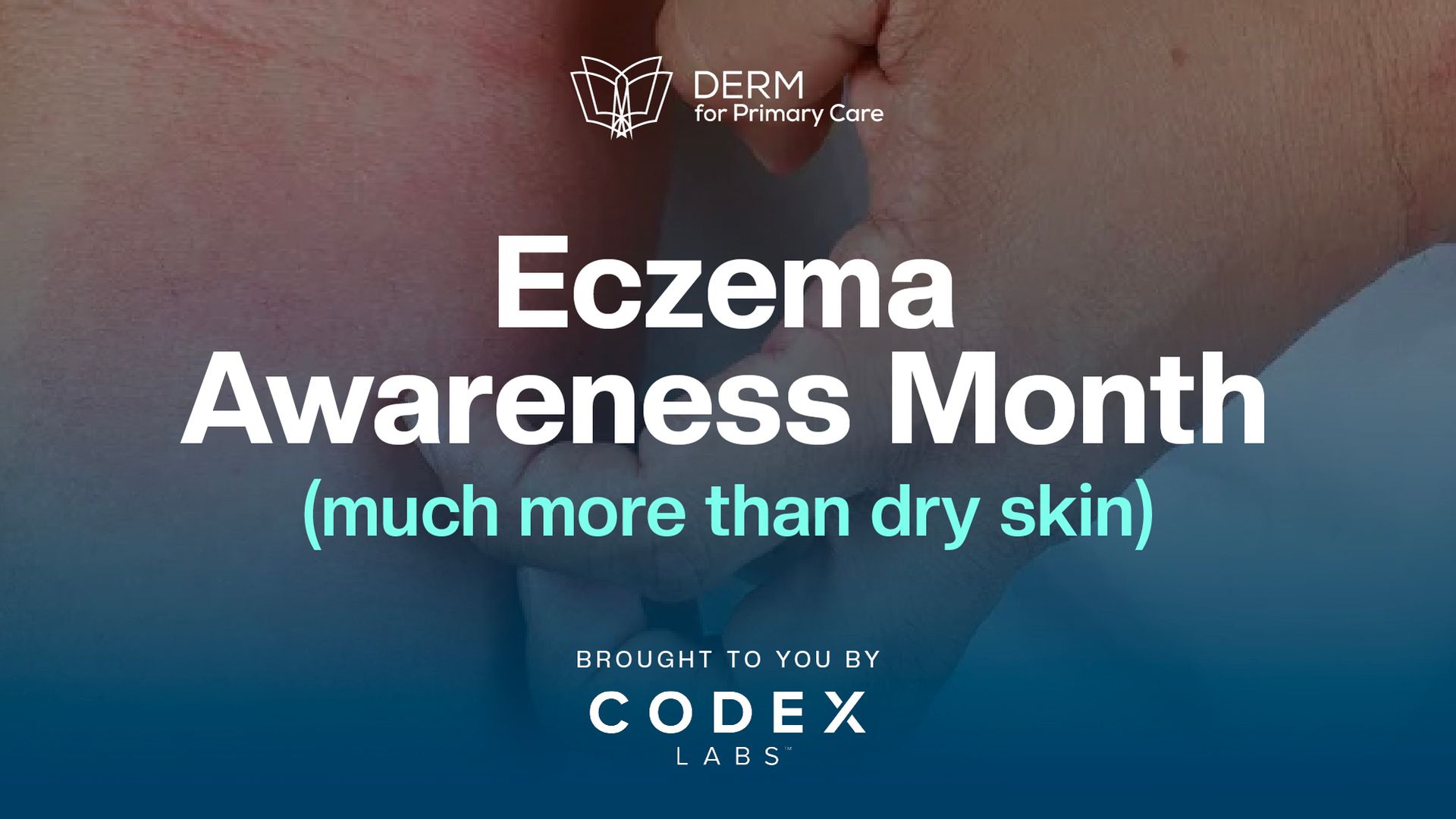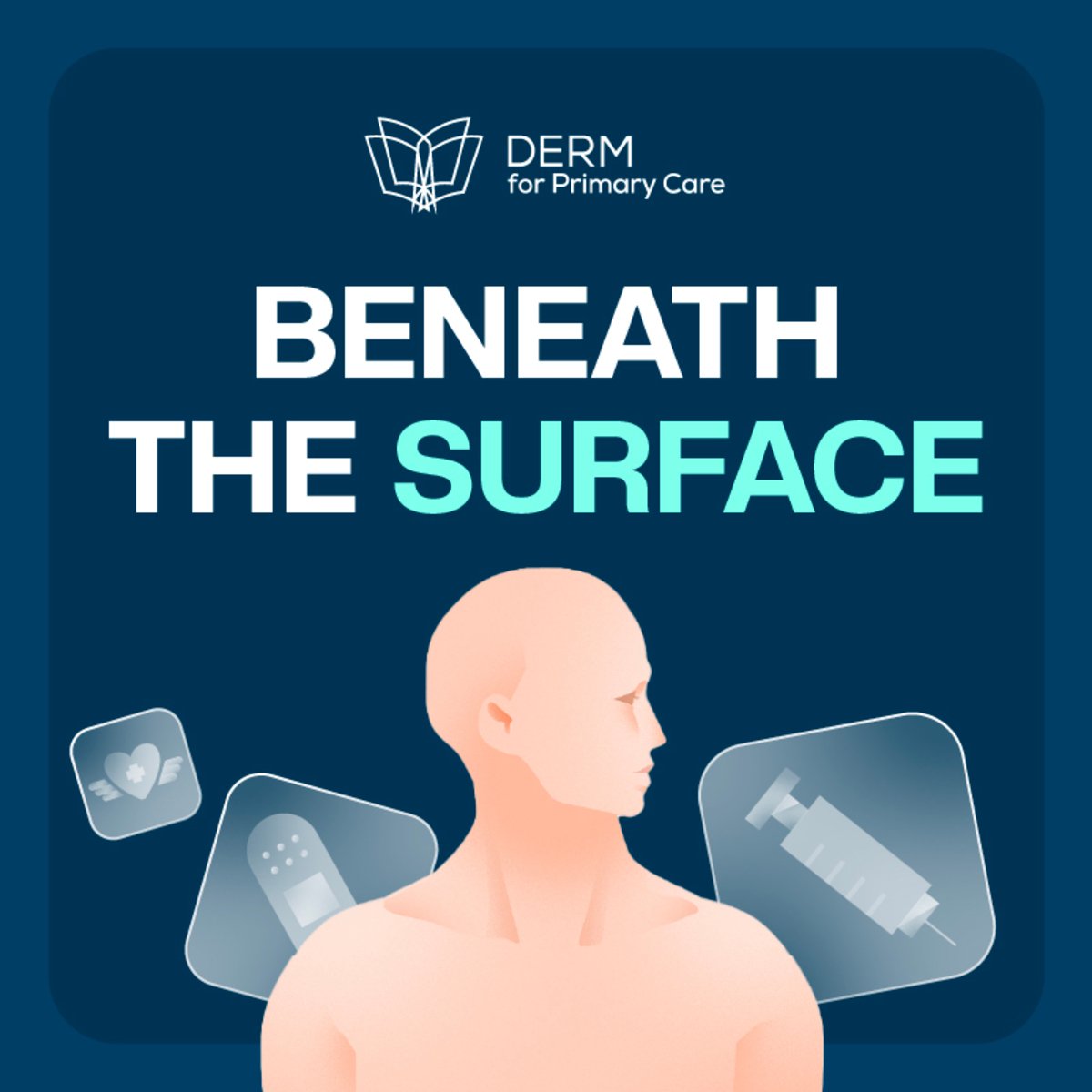This week’s issue is brought to you by Codex Labs
Welcome back, DERM Community!
October is Eczema Awareness Month, a time to spotlight one of the most common, burdensome, and misunderstood inflammatory skin conditions.
While often dismissed as “just dry skin,” eczema is anything but simple.
It’s itchy, relapsing, and deeply impacts sleep, focus, mood, and quality of life. And for many patients, topical steroids or moisturizers aren’t enough or don’t feel like the right fit.
This week we’re equipping you with tools to improve patient care:
Recognize eczema with confidence
Tailor treatment strategies to age, severity, and lifestyle
Debunking myths regarding eczema
Let’s dive into the essentials every clinician should know.
Featured on This Week’s Chapter:
Learning Opportunities:
Meet Lena, a 19-year-old with red, itchy patches in the flexural folds of her arms and neck.
Her symptoms flare in winter and during finals week. She has a history of asthma, and her scratching has led to visible lichenification.
She’s tried steroid creams, but admits she’s not using them consistently; partly from concern, partly from lack of results.
This is a classic eczema patient and a powerful reminder that treatment plans must address both symptoms and beliefs.
Eczema: What You Need to Know
Eczema, also known as atopic dermatitis, is a chronic inflammatory skin condition characterized by dry, itchy, and inflamed skin.
It's driven by barrier dysfunction, immune dysregulation, and a complex interplay of genetic and environmental factors.

It often starts in childhood but can affect individuals at any age.
Flares are commonly triggered by irritants, allergens, weather changes, stress, or infection. Many patients also have comorbid conditions like asthma, allergic rhinitis, or food allergies.

But it extends far beyond the skin.
A compromised barrier allows allergens, irritants, and microbes to penetrate, triggering inflammation, while gut health can amplify this response: imbalances in the microbiome may increase systemic inflammation and make flares more severe.
Stress compounds the problem by activating the hypothalamic–pituitary–adrenal axis, raising cortisol and other inflammatory mediators, which in turn worsen itch and barrier disruption.
This often leads to sleep disturbances, and poor sleep further dysregulates immune function, creating a self-perpetuating cycle that intensifies symptoms and impacts quality of life.
Recognizing these interconnected factors underscores why effective care must address the whole system: supporting the skin, managing stress, optimizing sleep, and considering gut and immune health (not just the visible lesions).
What About Additional Care Options?
While topical and systemic therapies remain the standard of care, many patients continue to ask about non-prescription or other therapeutic options.
As clinicians, it’s important to:
Stay informed about emerging options (moisturizers, barrier creams…)
Ensure any product used supports the skin barrier and avoids allergens or irritants
Reinforce that natural does not mean risk-free
These conversations are also an opportunity to guide patients who are hesitant about traditional therapies, especially those who haven’t seen results or are seeking more integrative approaches.
By understanding what’s out there, we can help them choose safe, evidence-informed options that complement their treatment plan.
We’ve Put Together a Free Guide Just for You!

Eczema Essentials FREE Guide.pdf
A practical, one-stop guide for clinicians on eczema diagnosis and management. Covers core pathophysiology, hallmark clinical features, diagnostic clues, stepwise treatment strategies, escalation criteria, and long-term care pearls; all designed to support evidence-based, confident decision-making in everyday practice.
3.31 MB • PDF File
Want to Go Deeper?
Take one of our modules
Whether you’re a clinician, student, or educator, our eczema module breaks down atopic dermatitis, contact dermatitis, dyshidrotic eczema, nummular eczema, and more.
Book Recommendation of the Week
“The Eczema Detox: The Low-Chemical Diet for Eliminating Skin Inflammation” by Karen Fischer
Blending clinical insights with practical strategies, this book explores dietary and lifestyle factors that influence eczema. A valuable complement for clinicians seeking to better understand patient-driven, integrative approaches.
Inspiration of the Week
“Cure sometimes, treat often, comfort always.”
-Hippocrates
👋🏻 See you next Thursday, DERM community!
This week, we explored eczema: from barrier dysfunction to stress, from treatment to patient beliefs.
Next week, we’ll continue the in-depth journey on eczema, diving deeper into the skin microbiome, the skin barrier, and their role in eczema.
If today’s chapter gave you a sharper lens on eczema, share it with your colleagues, students, or patients, they’ll thank you for it.
Thank you for being here with us!
— The Derm for Primary Care Team




